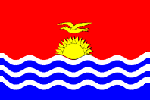Kiribati
| Law Summary | The Special Fund (Waste Materials Recovery) Act 2004 was a project to provide access to solid waste services and improve Kiribati's ability to deal with water and land pollution caused by uncollected and uncontained wastes |
|---|---|
| Date Implemented | February 3, 2005 |
| Containers Covered | Aluminum cans and PET bottles |
| Beverages Covered | All beverages in the containers above |
| Refundable Deposits | 5¢ per container (only 4¢ is returned to the consumer) |
| Fees / Taxes | The Kaoke Mange operator keeps 1¢ per container for operating costs |
| Unclaimed deposits | Unredeemed Deposits remaining in the Special Fund will slowly accrue to provide capital for equipment replacement over time. The Act allows the Special Fund to use excess funds for waste management |
| Program Success |
|
Details
Operator of the materials recovery facility (the Kaoki Mange Operator) is a private entity. The beverage container deposit law was part of an initiative known as the Kaoki Mange! (Send back the rubbish!) Project, which also includes a deposit-based ($5) lead-acid battery recycling program and a car recycling program, plus initiatives to reduce organic and landfill waste.
How the deposit system works
- 5¢ is paid at import for every aluminium drink cans or PET plastic (No.1) bottle.
- The money is collected by the Kiribati Customs Service at First Entry, in the same manner as the Outer Island Freight Levy.
- The money is then deposited into the Special Fund set up under the Act. This money is not a tax. It is a deposit on the cans and bottles to finance the refund. This money is paid by Customs according to the account code for the Special Fund provide by the Ministry of Finance
- The money in the Special Fund is only available for refunding the items which have had a deposit paid, or associated recycling activities.
- The Importer has now paid 5 cents' deposit per item, and must pass the 5¢ on to the stores.
- The stores must pass the 5¢ on to the consumer.
- The consumer drinks the drink, and brings the can to the Kaoki Mange Collection points, and receives 4 cents per item, or effectively 20¢ for 5 cans and bottles. This rate of refund is determined in the Regulations attached to the Special Fund Act.
- The Kaoki Mange Operator claims back 5 cents, for every item refunded, from the special fund. This includes 1¢ that the Operator keeps as a contribution to running costs, as described in the Regulations.
- This Refund is claimed from the Special Fund through the Ministry of Finance.
- The Kaoki Mange Operator crushes the material and exports it for recycling.
- The Kaoki Mange Operator keeps the 1 cent per item to help finance the crushing and export of lower value items such as plastic bottles and cardboard
Photos
Other Resources
- This article from Island Business explains the Kaoki Mange project and its successes and popularity: 'Return the Rubbish' a hit in Kiribati
- Kaoki Mange annual report from 2005: With an explanation of the project goals and how they have been met [PDF, 123Kb]
Footnotes
1. Impact of the Greenbag on Waste Generation in South Tarawa, IWP Kiribati, January 2006
Updated
February 13, 2008

